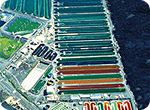Originally published October 25 2004
Spirulina: trace minerals content, consumer tastes, and green foods
by Mike Adams, the Health Ranger, NaturalNews Editor
Mike: You mention that trace minerals are part of the food you provide to the spirulina cultures. Are these the same trace minerals that are found in ocean water, then, and how much are absorbed by the spirulina?
Gerry: Well, we actually use something very unique which I don't think is duplicated anywhere in the world and that is at each batch of spirulina we produce, we add a measured amount of this deep sea water that is very rich in trace minerals. It actually provides all 96 trace minerals known, and it is absorbed very well. Spirulina is excellent at absorbing and really naturally chelating these minerals into a bioavailable form.
Mike: So, what we typically call an organic form of trace minerals, I think it's important for people to understand the difference, because if someone is just drinking trace minerals from seawater, that's a very different molecular form than what's found in the spirulina, correct?
Gerry: That's correct. It's usually associated or chelated with some other compounds that make it much more bioavailable to the body.
Mike: Let me ask you about the taste of spirulina, because many people, if they're not used to consuming these superfoods, the first thing that happens when they see something that has spirulina in it, like a blended shake of some kind, they're a little shocked -- it's sort of bluish-green. When they taste it, at first they might be a little shocked, but over time, the taste tends to become quite likable. What has been your experience with customers and the taste of spirulina?
Gerry: Well, it's been very similar. It certainly has what we call a mild sea-vegetable taste and smell. It's interesting that we do have Japanese customers, when they come by, from the very beginning they love the taste and the smell of the spirulina. They're much more into eating seafoods and sea vegetables. But you're absolutely right -- spirulina put into any kind of a shake or a smoothie definitely turns it very vividly green-blue. In a shake or smoothie the taste can certainly be masked with other things like apple juice or pineapple juice, so it doesn't taste bad at all. But as you take spirulina, you do develop a taste for it -- it's something that I've come to enjoy.
Mike: Indeed. I second that -- over a period of months I came to enjoy it, and now if it's not in the smoothie, I miss it.
Gerry: I agree.
Mike: What about products on the shelf that contain Cyanotech's spirulina? What are some popular products that people can look for?
Gerry: Well, certainly there are a lot of, as you mentioned, smoothie bars that people add spirulina to. Spirulina is in a number of drink mixes, dried drink mixes that can be purchased in health food stores. It's in some energy bars that I know of. The major way that spirulina is sold is in either tablets or powder for individuals to add to foods or smoothies.
Mike: And is there a way that people can purchase these supplements directly from your company?
Gerry: Well, not from Cyanotech. Cyanotech supplies bulk raw materials to other manufacturers, but we do have a subsidiary called Nutrex Hawaii -- Nutrex for "nutritional excellence" -- and the Nutrex Hawaii product, the spirulina pacifica, is available in about 3500 health food stores across the country, and in addition it can be purchased over the web at http://www.nutrex-hawaii.com.
Mike: Okay. So that's a retail site -- they can buy there and have it shipped to them?
Gerry: Right.
 This article is part of an exclusive interview with Dr. Gerry Cysewski, CEO and founder of Cyanotech Corporation http://www.cyanotech.com, located in Kona, Hawaii. Cyanotech's spirulina and astaxanthin products are available in retail stores (look for products made with "Hawaiian spirulina") or through Nutrex-Hawaii at http://www.nutrex-hawaii.com.
This article is part of an exclusive interview with Dr. Gerry Cysewski, CEO and founder of Cyanotech Corporation http://www.cyanotech.com, located in Kona, Hawaii. Cyanotech's spirulina and astaxanthin products are available in retail stores (look for products made with "Hawaiian spirulina") or through Nutrex-Hawaii at http://www.nutrex-hawaii.com.
The aerial photo on the left shows Cyanotech's farms. The dark green culture ponds contain spirulina, while the reddish ponds contain astaxanthin in various stages of growth. The dark land mass on the right is a lava field.
Editors note: Spirulina is one of the superfoods I consume on a daily basis. Due to my passion about superfoods nutrition, I traveled to Kona, Hawaii to conduct a series of interviews with Cyanotech personnel. To find all available articles on Cyanotech, just type "Cyanotech" in the search box below. New articles are being added regularly.
REVIEW TYPE
All content posted on this site is commentary or opinion and is protected under Free Speech. Truth Publishing LLC takes sole responsibility for all content. Truth Publishing sells no hard products and earns no money from the recommendation of products. NaturalNews.com is presented for educational and commentary purposes only and should not be construed as professional advice from any licensed practitioner. Truth Publishing assumes no responsibility for the use or misuse of this material. For the full terms of usage of this material, visit www.NaturalNews.com/terms.shtml
 This article is part of an exclusive interview with Dr. Gerry Cysewski, CEO and founder of Cyanotech Corporation http://www.cyanotech.com, located in Kona, Hawaii. Cyanotech's spirulina and astaxanthin products are available in retail stores (look for products made with "Hawaiian spirulina") or through Nutrex-Hawaii at http://www.nutrex-hawaii.com.
This article is part of an exclusive interview with Dr. Gerry Cysewski, CEO and founder of Cyanotech Corporation http://www.cyanotech.com, located in Kona, Hawaii. Cyanotech's spirulina and astaxanthin products are available in retail stores (look for products made with "Hawaiian spirulina") or through Nutrex-Hawaii at http://www.nutrex-hawaii.com.